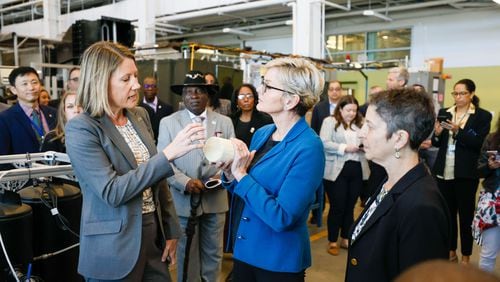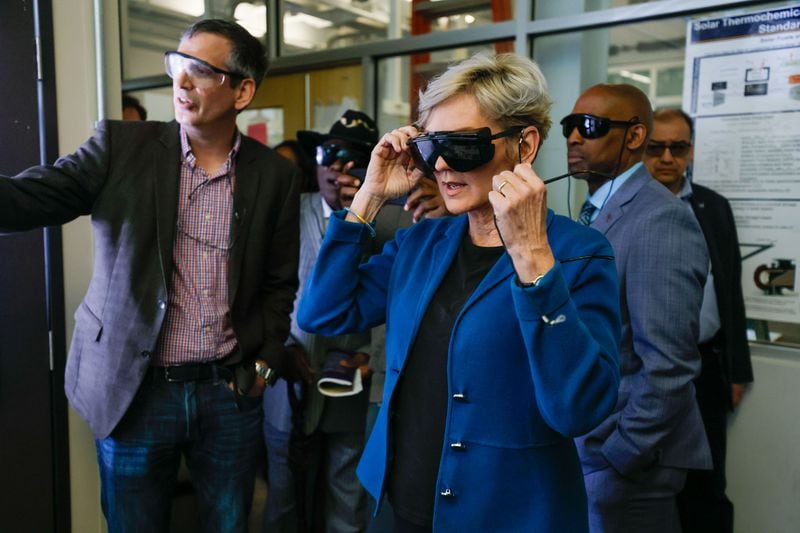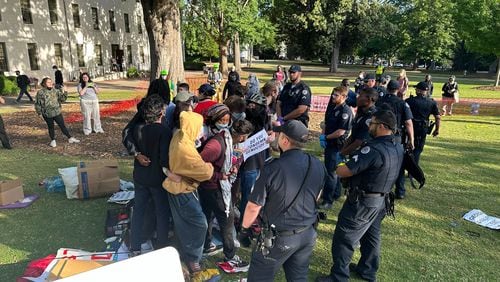Energy Secretary Jennifer M. Granholm announced Thursday a Georgia partnership will receive funding to develop green energy innovations as part of the Energy Future Grants Program.
The partnership of Atlanta, Decatur, Savannah and Georgia Tech is one of 40 teams to receive a grant. In total, the Department of Energy will provide $27 million. The local partnership will receive $500,000 and will compete with other recipients for additional levels of grants to enact their plans.
Granholm announced the grants at Georgia Tech on Thursday alongside Atlanta Mayor Andre Dickens and U.S. Rep. Nikema Williams, D-Ga. Granholm toured Georgia Tech’s energy labs, seeing high-tech equipment used to filter carbon dioxide and simulate solar energy and heard about the potential application to cleaner energy and sustainable resources.
The grants allow for recipients to develop plans based on their needs and help the areas that need resources the most. Granholm said it was fitting the announcement was at Georgia Tech because its tools “are going to be magnificent for this project for communities to decide the best path for them based on data.”
Credit: Miguel Martinez
Credit: Miguel Martinez
Dickens said the city is making progress toward a goal of a complete transition to clean energy by 2035 and noted goals for Atlanta such as mitigating rising utility costs and the effects of climate change, particularly in underserved communities.
Williams touted the grants as an example of environmental justice, saying they “are a sign of the Biden-Harris administration’s commitment to equitably investing in communities with a focus on marginalized communities that are historically overlooked for federal investments.”
Granholm’s visit to Atlanta included stops at the Russell Innovation Center for Entrepreneurs, an incubator focused on supporting Black businesses; and Morehouse College for a roundtable with leaders from Atlanta’s historically Black colleges and universities.
Throughout, she and others promoted President Joe Biden’s energy policies that she said are helping bring back manufacturing — including several facilities in Georgia — and make U.S. companies competitive in the global green energy market.
She highlighted tax credits for electric vehicle purchases and incentivizing use of American-made parts for vehicles and various batteries to rebuild domestic supply chains — last week, Treasury Secretary Janet Yellen visited a reopening solar cell manufacturer in Norcross that will supply cells to domestic companies.
To support manufacturing, Granholm said the administration is supporting a stronger skilled workforce by promoting apprenticeships, opening pathways for unionization and investing in science, technology, engineering and math at historically Black and minority-serving institutions.
Morehouse previously received a Clean Energy Education Prize of $100,000. At Thursday’s roundtable at Morehouse, representatives from Atlanta’s HBCUs described efforts such as a program that gives students early exposure to the chemistry manufacturers use to develop electrical vehicle batteries and another focused on developing self-powered drones.
Shadeed Abdul-Salaam, director of sustainability at Morehouse, said it will be critical for HBCUs to share and elevate one another’s work when they do receive opportunities.
Referencing facilities Granholm toured at Georgia Tech, Abdul-Salaam said, “Our goal is to have these spaces here to elevate research and engage in this great tsunami (of innovation) as it’s being formed.”








